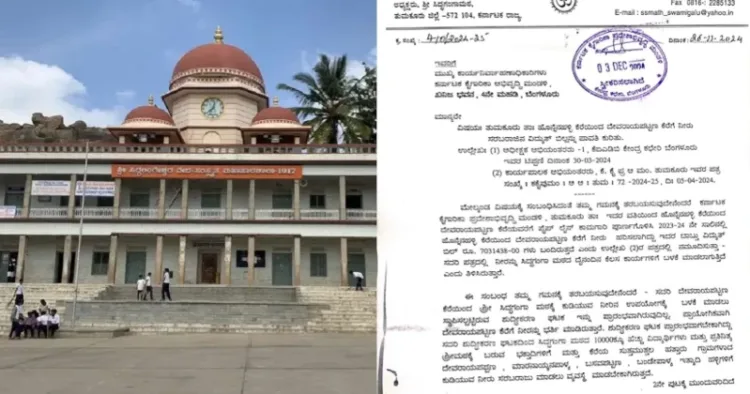In a recent incident that has sent shockwaves throughout the local community, the Karnataka Industrial Area Development Board (KIADB) issued a staggering notice demanding that Siddaganga Matha, a revered institution dedicated to education and social welfare, pay a staggering amount of Rs 70,31,438 for electricity bills. These costs are tied to an ongoing government irrigation project to supply water to the Mutt and various surrounding villages. Far from being a mere administrative blunder, this demand poses a significant existential threat to an organisation providing education, food, and shelter to thousands of underprivileged children annually.
The notice, which sparked widespread criticism and outrage, was dispatched to Siddaganga Matha under the pretext that the electricity bill incurred was due to water being pumped from Honnenahalli Lake to Devarayapattana Lake. The underlying premise of this undertaking is to facilitate water supply to various localities, including the Mutt itself, intended for agricultural and everyday needs. Yet, the KIADB’s obligation to foot the bill for the essentials associated with this public project became a bewildering demand placed on a religious institution rather than a valid call for public accountability.
Siddaganga Matha has long been considered one of the cornerstones of community service in Karnataka, serving as a sanctuary for education and providing meals and care for thousands of needy children. Acknowledging its societal contribution is imperative, especially when contemplating religious institutions’ obligations to the community’s welfare. Issuing a bill that places the burden of funding onto such an organisation runs counter to the ethos of public service and raises disturbing questions about governmental priorities.
After the backlash, Minister MB Patil announced on Thursday that the government had withdrawn the bill, which officials of KIADB falsely sent. Commenting on the notice’s withdrawal, he confirmed that the demand was a misstep, stating that Siddaganga Matha should not bear the financial fallout of an initiative fundamentally rooted in public service. “It would be absurd to penalise them for utilising resources intended for community use,” he asserted. Though this statement comes as a relief, it raises significant concerns about the procedures in place at KIADB and the lack of oversight regarding the decisions made by its officials.
The fact that such a controversial notice could be issued without considering Mutt’s significance illustrates a troubling disconnection between government bodies and community-supporting institutions. The lack of dialogue before issuing such a heavy financial responsibility suggests a cavalier attitude towards organisations working tirelessly to mitigate socio-economic disparities. Siddaganga Matha has provided shelters for thousands of children and often supports families in financial distress through education, free meals, and vocational training. Imposing a financial burden of this magnitude could have devastating implications on its ability to perform these critical functions.
The educational reach of Siddaganga Matha cannot be understated, as it has played a pivotal role in shaping the lives of countless children who may not have had access to schooling otherwise. The Mutt’s commitment to nurturing young minds and instilling values of compassion and social responsibility demonstrates its invaluable status in the community. The callousness of the KIADB’s demand highlights a systemic failure wherein the government seems detached from the realities faced by charitable organisations serving the public good.
Following substantial backlash from the public, further fueled by media coverage, including an impactful report from ‘visual media,’ the government was compelled to retract its earlier directive. This action does little to erase the troubling implications underlying the incident. It reveals an urgent need for reform within governmental agencies to oversee public projects. Accountability measures must be enforced to ensure that such blunders do not recur in the future.
Despite the government’s retraction of the notice, questions about the systemic issues within the KIADB persist. The lack of communication between government officials and institutions, such as Siddaganga Matha, is alarming. In an ideal scenario, there should be a collaborative, trust-focused relationship rather than one steeped in financial paternalism. Efforts to engage local entities in dialogue about projects and resource management would foster an environment of cooperation and mutual respect.
Community leaders and members within the area have voiced their concerns regarding the broad implications of the incident, emphasising that the regional government must do more to ensure the welfare of institutions that provide vital support to those in need. They demand mechanisms guaranteeing that organisations like Siddaganga Matha are treated with the dignity and recognition they deserve.
Siddaganga Matha’s President, Siddalinga Swamiji, has echoed these sentiments, expressing astonishment at the notion of penalising the Mutt for its necessary involvement in a government-managed project. He underscored that a notice demanding payment for essential services appears incongruous, especially given the Mutt’s extensive community contributions.
Ultimately, this contentious episode serves as a crucial reminder of the need for the government to foster relationships of partnership and support with grassroots organisations rather than imposing burdens that threaten their ability to thrive. The public’s reaction to this incident suggests that the community is watching closely and expects accountability from their leaders.
This incident not only highlights the vital role that Siddaganga Matha plays in nurturing children’s futures but also serves as a wake-up call for the Karnataka government. Policymakers must recognise the importance of supporting organisations that sustain vulnerable populations, ensuring their capabilities to provide essential services are preserved.
Policymaking and governance should not merely be a matter of administrative procedures, but a moral commitment to uplift and advocate for those who dedicate themselves to the community’s welfare.



















Comments